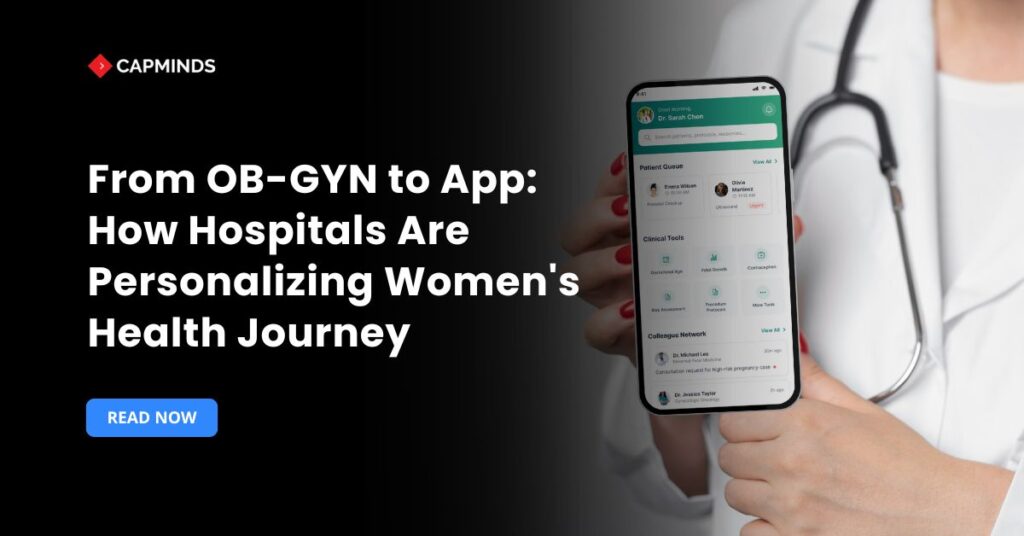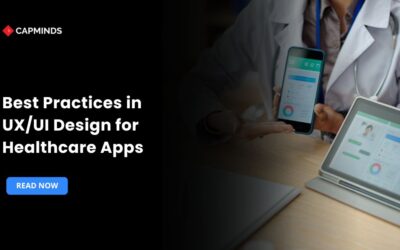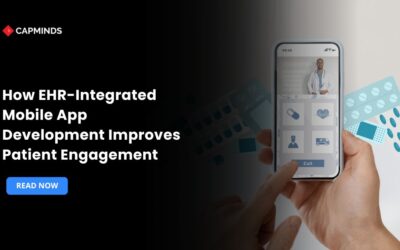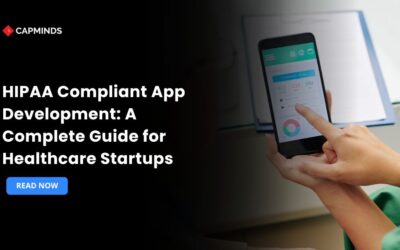From OB-GYN to App: How Hospitals Are Personalizing Women’s Health Journey
Digital transformation in healthcare is reshaping how women experience care, and nowhere is this more evident than in obstetrics and gynecology (OB-GYN). Hospitals and clinics are increasingly leveraging mobile health applications to personalize women’s health journey from fertility and pregnancy through menopause. This shift is driven by both technology and patient demand.
Women’s health practices boast some of the highest patient digital engagement levels across all medical specialties, indicating that female patients are especially receptive to digital tools.
Younger generations of women are leading the way – Gen Z and millennial women eagerly use online portals, mobile apps, and telehealth for tasks like scheduling appointments, filling out forms, and monitoring their health at higher rates than their older counterparts.
By embracing well-designed apps, OB-GYN providers can meet women where they are (often, on their smartphones) and tailor care to individual needs and life stages.
The result is a more connected, convenient, and empowering healthcare experience for women and new opportunities for providers to improve outcomes and efficiency.
Digital Transformation in Women’s Health Care
Women’s health is finally receiving dedicated attention in the digital health revolution. In the early days of health IT, solutions tended to be one-size-fits-all, often overlooking the unique needs of women.
Today, we see a different story: digital health solutions designed specifically for women are emerging as powerful tools to provide personalized care and ensure equitable access to quality health services.
- These include everything from mobile apps and wearable devices to virtual consult platforms – all tailored to women’s health needs.
- This targeted approach is helping close historical gaps in care by offering women customized support for reproductive health, pregnancy, and beyond.
- Crucially, digital technology enables a continuum of care that spans the various phases of a woman’s life.
- Industry experts note that personalized, digitally enabled platforms providing a seamless spectrum of services – from fertility through pregnancy to menopause – are poised to become the “winning model” in women’s healthcare.
- Telemedicine and artificial intelligence (AI) are key enablers in this transformation: providers are using telehealth to reach women regardless of geography and AI-driven analytics to tailor recommendations at an individual level.
In practical terms, a woman might use the same healthcare app to track her contraception and menstrual health in her 20s, receive prenatal care guidance and remote monitoring in her 30s, and manage menopause symptoms in her 50s – all through one connected digital ecosystem.
This kind of lifelong engagement is becoming a strategic priority, as women increasingly expect health care experiences that evolve with their needs across decades.
Equally important, digital engagement empowers patients. Modern women’s health apps offer personalized insights and tools that allow women to take control of their well-being. Through user-friendly interfaces and data analytics, women can navigate their health journeys with greater confidence and autonomy. This patient-centered approach is a win-win: women feel more supported and informed, while providers gain more consistent touchpoints to guide care decisions.
Overall, the digital transformation in OB-GYN care isn’t just about technology for its own sake – it’s about rethinking the care model to be more continuous, proactive, and attuned to each woman’s life story.
OB-GYN Care Meets mHealth: Key Digital Tools and Features
What does it look like when OB-GYN care goes mobile? In practice, it means that many traditional aspects of women’s healthcare are being augmented or reimagined through smartphone applications and connected platforms. Here are some of the key digital tools and functionalities hospitals are incorporating to personalize OB-GYN care:
On-Demand Scheduling & Reminders
Mobile apps let patients seamlessly book, reschedule, or cancel appointments without a phone call. This 24/7 convenience not only improves patient satisfaction but also reduces no-shows and administrative overhead for the clinic.
Automated reminder notifications (for upcoming prenatal visits, annual exams, etc.) help ensure women stay on track with recommended care.
Telehealth Consultations
Integrated telemedicine features enable virtual OB-GYN visits and advice on the go.
Whether it’s a video consultation for a prenatal check-in or a secure chat to discuss birth control options, women can seek medical guidance without an in-person visit when appropriate. Especially for routine follow-ups or questions, telehealth makes care more accessible and flexible.
Symptom & Health Trackers
Many women’s health apps serve as personalized health journals. Patients can log menstrual cycles, ovulation signs, pregnancy symptoms, fetal movement counts, or menopause-related symptoms day by day.
These tracking tools transform a patient’s smartphone into a personal health coach, and the collected data can be invaluable for both patient and provider when making care decisions. For example, a woman trying to conceive can chart her cycle and share patterns with her OB-GYN to inform fertility planning.
Remote Monitoring Devices
Mobile technology is linking with wearable sensors and at-home medical devices to bring portions of prenatal and gynecological care out of the clinic and into the home.
For instance, a pregnant patient at risk of complications may use a connected blood pressure cuff or glucose monitor that automatically sends readings to her care team. Such remote patient monitoring allows doctors to keep an eye on vital health indicators in real time and intervene early if needed.
Studies have shown this approach can improve outcomes, for example, by helping curb excessive weight gain during pregnancy through timely feedback.
Related: Remote Patient Monitoring 101: The Ultimate Integration Guide
AI-Powered Chatbots & Virtual Assistants
Advancements in AI are being put to work to support OB-GYN patients around the clock. Chatbots built into health apps can answer common questions (e.g., “Is this symptom normal in pregnancy?”), provide medication reminders, and even offer reassurance or mental health tips, acting as a first line of support before a patient reaches out to a clinician.
These virtual assistants use AI-driven insights to personalize their responses and can triage issues that need a doctor’s attention, helping women get timely advice.
Personalized Education Resources
Education is a cornerstone of patient-centered care, and apps are making reliable information more accessible. Hospitals are equipping their women’s health apps with libraries of vetted articles, short videos, and FAQs covering topics from contraception and prenatal nutrition to postpartum recovery and menopause management.
Crucially, this content can be tailored to each patient’s stage and needs – for example, showing pregnancy-safe medication guides to an expectant mother or menopause lifestyle tips to a woman in midlife. By delivering relevant knowledge on demand, apps help patients make informed decisions and feel more prepared for what’s ahead.
Secure Messaging and Communities
Beyond scheduled telehealth visits, many platforms offer secure two-way messaging that lets patients ask questions or update their provider in between appointments. Some also incorporate community forums or support groups (often moderated by professionals) where women can share experiences and encouragement with peers.
- For instance, expectant mothers might swap tips for managing pregnancy symptoms, or menopausal women might discuss coping strategies.
- These virtual support communities can reduce isolation and foster a sense of solidarity, all within a safe digital space linked to the hospital’s app.
EHR Integration & Data Sync
A critical behind-the-scenes feature is integration with electronic health records. When a hospital’s app is synced to its EHR system, data flows securely between the patient’s phone and her medical chart.
- This means the information a woman logs – her symptom diary, medication adherence, home test readings – can be available to her OB-GYN before she even walks into the exam room.
- Such integration ensures continuity and up-to-date information for clinicians, eliminating the need for patients to re-explain details and enabling data-driven, personalized consultations.
It also improves operational efficiency by automating the documentation of patient-reported data into the clinical workflow.
Related: The Ultimate Guide to EHR/EMR Integration with HL7 & FHIR Interfaces
By deploying these digital tools, hospitals transform the OB-GYN care model from a periodic, appointment-centered encounter into a continuous, interactive partnership.
The app becomes an extension of the care team, keeping patients engaged daily, providing guidance and monitoring in real time, and alerting clinicians to issues early. This comprehensive feature set ultimately creates a more personalized health journey for each woman, as the care she receives can dynamically respond to her inputs, preferences, and evolving life circumstances.
Tailored Care at Every Stage: From Fertility to Menopause
One of the most powerful aspects of an OB-GYN mobile app is its ability to adapt to the patient’s stage of life, delivering relevant support whether she’s trying to conceive, expecting a baby, or navigating menopause. Hospitals are using mHealth platforms to ensure women remain connected to care through all these milestones, with features customized to each phase:
Fertility & Family Planning
For women in the preconception and family planning stage, digital tools offer knowledge and support that can reduce stress and improve preparedness.
For example, a fertility tracking feature allows a woman to log her menstrual cycles, track ovulation predictors, and record any symptoms or moods.
- This information helps her identify patterns and fertile windows, and it’s equally valuable to her OB-GYN or fertility specialist during consultations.
- In-app reminders might prompt her to take prenatal vitamins like folic acid or to schedule a preconception checkup.
- Some hospitals also offer virtual coaching or Q&A for women planning a pregnancy, via either a care navigator or an AI chatbot, to answer questions about optimizing health before conception.
All of this amounts to personalized, proactive care before a patient even becomes pregnant. By engaging women early with digital tools, providers can build a trusting relationship and a baseline of health data that will carry forward into pregnancy.
Pregnancy & Postpartum Care
Pregnancy is a time when many women seek information and frequent reassurance, and a well-designed app becomes an ideal companion throughout the journey. Pregnancy tracking features typically provide weekly updates on the baby’s development and changes in the mother’s body, which was identified as one of the most helpful app features in a study of expectant mothers.
Through the app, a patient might receive customized tips each week and educational content about what to expect at upcoming prenatal visits. Just as importantly, the app can send alerts for critical health to-dos – for instance, reminding a patient about her scheduled ultrasound or to complete a glucose screening.
For clinical monitoring, many hospitals are introducing remote monitoring programs for pregnancy via their apps. If a pregnant patient needs closer watch for a condition like gestational hypertension or diabetes, she may be provided with connected devices. When she uses these at home, the readings are automatically transmitted to her care team through the app.
- This approach has yielded impressive results: in one program, patients who had their weight tracked remotely during pregnancy gained significantly less excess weight and retained less weight postpartum compared to those without monitoring.
- Another study addressed postpartum care, finding that nearly two-thirds of new mothers who used an app-connected blood pressure cuff for home monitoring adhered to their follow-up plan for hypertension, whereas none of the patients asked to self-record readings on paper followed through.
These examples underscore how digital tools can dramatically improve adherence and outcomes during and after pregnancy by making it easier for women to participate in their care between office visits.
Postpartum support is another vital element. After delivery, a woman’s needs shift to recovery and caring for her newborn, and apps adjust accordingly. Hospitals are using apps to check in on postpartum women’s well-being and to flag any signs of postpartum depression or complications for early intervention. New mothers can use the app to get quick advice on issues like infant feeding or postpartum exercises, often via the same telehealth or messaging features used during pregnancy.
Some apps also connect postpartum patients with lactation consultants or support groups virtually, helping them navigate the challenging first weeks after childbirth.
By maintaining a continuum of digital care into the postpartum period, healthcare providers ensure that mothers don’t feel abandoned after leaving the hospital. Instead, they continue to receive guidance, whether it’s a push notification reminding them about their six-week check-up or an educational module on postpartum recovery. This sustained engagement improves continuity of care at a critical time when many women historically fell through the cracks.
Menopause & Midlife Health
As women reach midlife, their healthcare focus shifts, but the need for personalization and support is just as important. Menopause can bring a host of symptoms, and unfortunately, this stage of life has often been underserved by traditional care models.
Digital health is changing that. With a dedicated women’s health app, providers can accompany patients through perimenopause and beyond with targeted digital interventions.
- For instance, the app might include a symptom tracker for menopause, allowing a woman to log the frequency and intensity of hot flashes or mood swings.
- This record can help both patient and provider discern patterns and triggers, and it informs more tailored treatment discussions, such as whether lifestyle adjustments or hormone therapy are appropriate.
Additionally, apps can deliver personalized education on menopause management, covering topics like nutrition for bone health, strategies for managing stress, or information on therapy options, all curated to demystify the menopause transition.
Related: The 2025 Ultimate Guide to App Development for Healthcare
Telehealth plays a valuable role here as well. Access to menopause specialists might be limited in certain areas, but through virtual consultations, women can reach these experts for personalized care plans. The convenience of an app means that a working woman in her 50s can have a lunchtime video visit to discuss hormone replacement therapy, for example, rather than waiting months for an in-person appointment.
Moreover, digital platforms eliminate geographic barriers, uniting women with specialized care and even connecting patients for peer support. Many apps host community forums or mentorship programs where postmenopausal women share experiences and coping tips, which can significantly alleviate the feeling of going through it alone.
Preventive care is another focus for this life stage. Mobile apps help ensure women stay on top of routine health maintenance in midlife: they can send out reminders for mammograms, Pap smears, bone density scans, and other age-appropriate screenings. By integrating these nudges into a woman’s regular phone notifications, apps promote preventive care and early detection of issues.
- They may also provide wellness programs tailored for midlife – for example, exercise routines to maintain muscle mass, pelvic floor therapy exercises, or mindfulness sessions to improve sleep.
- All of these features contribute to improved quality of life and health outcomes for women in menopause.
Ultimately, by addressing each phase of a woman’s health journey with relevant digital tools, hospitals create a personalized continuum of care.
Women no longer experience their healthcare as isolated episodes tied to specific life events; instead, there is a through-line of support connecting one chapter to the next.
This continuous engagement builds loyalty and trust – a patient who used the hospital’s app during pregnancy is far more likely to return for gynecologic care or menopause support down the line because she’s already invested in that digital ecosystem. It’s a model that benefits patients through every milestone, and it solidifies the provider’s role as a lifelong partner in health.
Empower Women’s Health with CapMinds Custom Mobile Solutions
At CapMinds, we understand that modern OB-GYN care demands digital innovation.
Our custom mHealth app development services are designed to help hospitals and women’s health providers deliver personalized, connected care across every stage of a woman’s life, from fertility to postpartum to menopause.
With our deep expertise in healthcare technology, we create secure, scalable, and HIPAA-compliant mobile solutions that align with your clinical goals and patient expectations.
Our specialized solutions include:
- Custom mobile app development for OB-GYN and women’s health
- Seamless EHR/EMR integration for data continuity and care coordination
- Remote patient monitoring and telehealth features
- AI-powered chatbots, symptom trackers, and patient engagement tools
- Educational content modules and preventive care reminders
Let CapMinds help you transform your patient experience with intuitive, end-to-end digital care platforms.
Get in touch today to build a future-ready mobile solution for women’s health.




